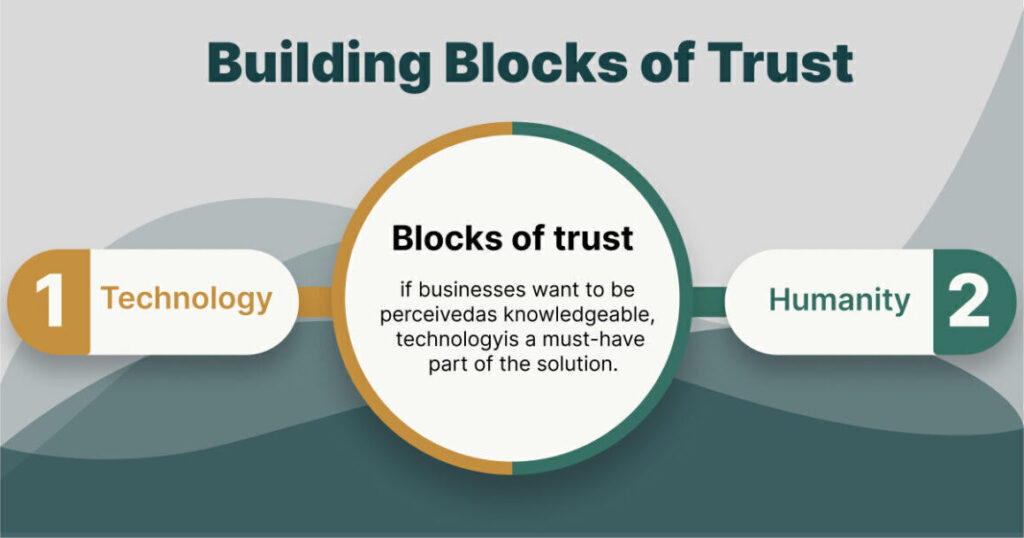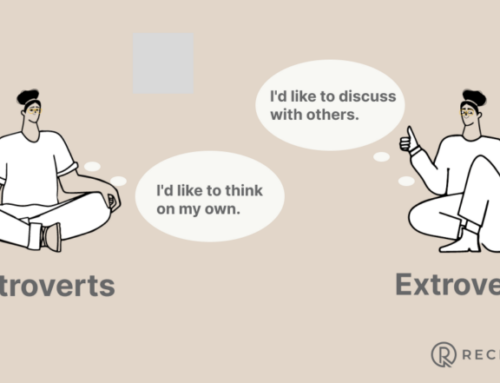
Many factors are worth mentioning when thinking about what plays a role in whether a business will succeed or not. Some might focus on the product, sales strategy, or branding, but one thing is clear – lasting trust has a lot to do with both employees and their loyalty, productivity, and engagement, as well as customers‘ attainment and satisfaction, making trust a huge competitive advantage. Trust is clearly an important aspect towards increased revenue and continuous growth.
From a broader perspective, what is the purpose of a business or any institution anyways if no one is going to use it? Even the best product in the world is useless without people. However, trust is not so easily gained, in fact, one has to be very intentional when it comes to building lasting trust because distrust seems to be the default now.
Building blocks of trust
The latest annual study by Edelman Trust Barometer (2022) found that 6 out of 10 respondents do not trust until proven trustworthy. It is no news that people are increasingly worried about the fairness and trustworthiness of institutions, the extent to which new technologies are being used accurately, how private and public information is being used, and the impact of technological advancement on people’s privacy, job security, and stability. This might not come as a surprise since even intuitively, constant change, the rapid pace at which businesses are developing, new and complex types of services, and the uncertainty that comes with all of it can all contribute to this lack of trust.
In the article published on the Harvard Business Review’s Blog, Jack Zenger and Joseph Folkman described three foundational aspects of trust (Zenger & Folkman, 2009).
They analyzed the data from 360 assessments of 87,000 leaders and found that the variability in trust ratings can be explained by three elements: consistency, expertise, and positive relationships. Consistency refers to acting and doing in the same way over time; expertise means a high level of knowledge, being informed and skilled; and positive relationships refer to staying in touch on others’ concerns and issues, honesty, and cooperation. Surprisingly, even though still important, inconsistency had the least negative impact among the three factors on the overall level of trust (Zenger & Folkman, 2009).
Following the findings of this study, here is how businesses can work on their trustworthiness through two, quite opposite ways – artificial and human.
1. Technology
As mentioned, being knowledgeable is crucial. Nowadays, being technologically advanced can almost be seen as equivalent to being up-to-date and developed. Countries and economies are accordingly seen as more or less developed by connecting the level of their technological advances used to more informed decision-making, less risky economic interactions, respect for the law, better education systems that support innovation, etc.
In comparison, the failure to adopt new tools and be aware of the new insights from various disciplines often diminishes the amount of trust. Intuitively, one could argue that we all want institutions to do the best they can, and advanced, rather than outdated, is usually perceived as better. Artificial intelligence is one example of new technology that can dramatically improve how people shop, communicate and work, transforming their quality of life. It is only reasonable to assume that a business, for example, an online store and AI that makes it possible to get improved services and experiences, that is not using those technologies is not up to date, and therefore, less competent.
In other words, if businesses want to be perceived as knowledgeable, technology is a must-have part of the solution.
2. Humanity
The second part of that solution can be seen as the contrast. From the technological side of the business to the humane side. Actually, successful leadership was mostly influenced by the presence or lack of positive relationships (Zenger & Folksam, 2009). Even though businesses may not be able to do the same actions to foster such relationships as leaders dealing with individuals, the bottom line is the same – communication, honesty, and care are mandatory.
When dealing with new, uncertain, and difficult-to-understand technologies, it is clear that businesses need to communicate what they are doing and why just as a popular saying in many languages states: “People don’t trust what they don’t understand”. Furthermore, being transparent about handling information is not only required by law, but it also builds a sense of honesty. Finally, care can be shown by actively dealing with issues such as risks, security and responding to customers’ concerns and questions.
The new role of business
On the positive side of the all-around lessened trust, one of the biggest findings from the 22nd Edelman Trust Barometer report (2022) is that businesses are seen as more trustworthy in comparison to other institutions, such as the government and media. At the same time, just because people might view businesses in a better light, doesn’t mean businesses are doing good enough in the eyes of respondents. As found in the same study, businesses should be more involved in societal issues, such as climate change, inequality, continuous learning, automation, and information handling (Edelman Trust Barometer, 2022).
Previous paragraphs highlighted some necessary requirements for building trust – businesses need to leverage the necessary technologies to be seen as effective while preventing people from becoming skeptical and distrusted of how organizations use such technologies. The problem is that in 2023, communicating what and how a company is using its technology probably isn’t enough.
Redefining trustworthy businesses
The solution could be in the values. Most of us can probably easily imagine a business that we know uses sophisticated technology and communicates with us properly. However, maybe that business is working to make our life easier but does not work to improve society in general, so we don’t agree with their hows and skip trusting them. In other words, people are more and more reflective, engaged consumers and more than 50% are choosing based on values and beliefs (ETB, 2022).
We already mentioned the importance of technology for trust, but technology has a vital role in ensuring responsibility too. More parts of the business can be tracked, checked, and followed, making it easier to find unethical practices. Organizational cultures, ways of working, inclusion, and diversity are all parts of businesses too. A lot of business processes can be adapted to be more caring for the environment and mindful of its effects on the environment. The data not only help businesses provide value to customers but can be of value to research and society, supporting more insights about us and how we work.
3. Responsibility
There is no reason to believe this trend will stop growing. Looking at this from the perspective of a necessity-sufficiency condition, expertise and communication might be necessary, but not quite sufficient for customers in 2023. This means that neglecting or acknowledging the new societal role and expectations for businesses will be a deciding factor for the future of a business. Apart from a consumer point of view, research is proving how impactful personal and organizational values are to employee productivity and overall organizational performance (Jin & Drozdenko, 2010).
By guiding technology use with strong values, such as responsibility, and communicating the same, businesses will likely have a better chance at giving people the tools to make informed decisions, choose what they want to support, and hopefully become worthy of their trust.
As always, businesses need to win people’s trust. In 2023, the standards are much higher.
Sources
Edelman trust barometer (2022)
The Cycle of distrust.
Available here (Accessed: 10 April 2022).
Jin, K.G., Drozdenko, R.G. (2010) Relationships among Perceived Organizational Core Values, Corporate Social Responsibility, Ethics, and Organizational Performance Outcomes: An Empirical Study of Information Technology Professionals.
J Bus Ethics. 92, 341–359
Available hereZenger, J. & Folkman, J. (2009) Harvard Business Review. The 3 Elements of trust.









